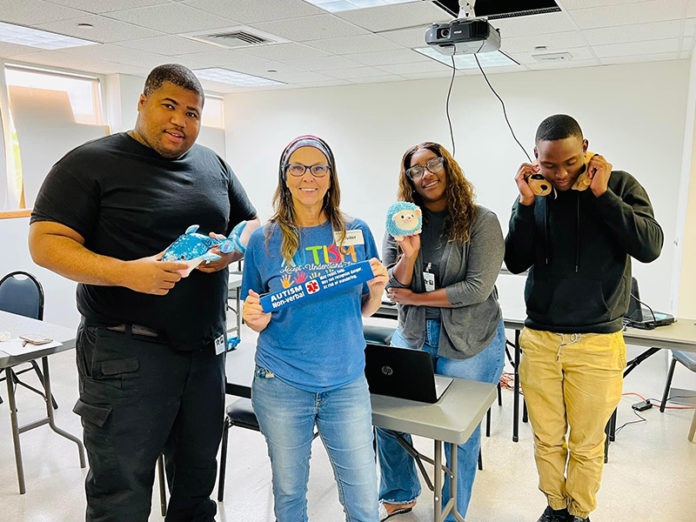
When Jill Campbell first started speaking about autism to Keys community groups, only one or two people in the audience knew someone with the spectrum disorder. Today, the spectrum disorder is familiar to nearly everyone in a Rotary club or business organization, said Campbell, who founded the Autism Society of the Keys (ASK) with her husband, Craig, when their 2½-year-old son was diagnosed 17 years ago.
“We knew nothing about autism, other than the movie, ‘Rain Man,’” Campbell recalls. “The diagnosis was devastating and the prognosis was no better. We were told our son would never speak, play with other children or be potty trained. The doctor told us to be prepared for institutionalization.”
When the shock wore off and reality set in, the Campbells, who live in Tavernier, turned to prayer, research — and other parents of autistic children. The support they found among those with shared experiences prompted them to form ASK as a local resource, sounding board and community education program.
Increased awareness, research and early intervention strategies have vastly improved outcomes for millions of kids with autism. The Campbells’ son was never institutionalized. He drives a car, is in typical high school classes, speaks as much as anyone and has a girlfriend. “Despite some hiccups and a quirkiness about him, he’s leaps and bounds ahead of everything we were told to expect,” she said.
But there’s still work to be done, and the famously generous Florida Keys community has helped, she said.
Key West Police Chief Sean Brandenburg’s support has been unwavering and “amazing,” said Campbell, who is partners in ASK with Key West parents Hope and Key West police detective Matt Haley, whose daughter is autistic.
Brandenburg ensures that all his officers are equipped and trained to respond effectively and sensitively to situations involving people with autism. Sheriff Rick Ramsay also fully supports ASK and ensures training for all deputies, Campbell said.
ASK has been assembling and distributing “sensory boxes” to help officers, teachers, firefighters and others establish a rapport with autistic people and calm a situation.

The boxes contain headphones to muffle loud noises and dry-erase boards so non-verbal people can communicate their name, phone number or other information. There are also fidget and squishy toys for stress relief and weighted stuffed animals known to soothe anxiety and other items.
“The boxes can be useful for all kids and for anyone with special needs, but each item is also hand picked by ASK as a tool for autistic children,” Campbell said.
Donations by local individuals, Rotary clubs, Home Depot and other local businesses, the Community Foundation of the Florida Keys, the Key West Business Guild and others have funded 250 boxes in the Florida Keys for the police department, sheriff’s office, fire departments, EMTs, schools and day care centers. A recent Key West Business Guild lunch raised enough money to sponsor 32 boxes, Campbell said.
“This community and our law enforcement are amazing. KWPD has 60 or so boxes, and I’d love to give the sheriff’s office enough boxes to ensure there’s always one in a patrol car nearby, as spread out as those deputies have to be.”
The law enforcement training teaches officers to recognize behaviors of people on the autism spectrum, which often include unexpected, repetitive movements known as stimming. Officers also learn that many autistic kids bolt to escape stressful scenarios and very often seek out water.
“Drowning is the No. 1 cause of death for kids with autism, and our island chain is surrounded by water,” Campbell said, so it’s a huge relief to know local law enforcement officers understand that tendency.
“Stimming behaviors — repetitive rocking, flailing or hitting themselves or others — can often be mistaken by police as drug-induced behavior,” Hope Haley told the Keys Weekly last year, which is why the police training is so essential and appreciated by ASK members.
Campbell recalled a police incident years ago, when an officer encountered an autistic person who kept saying he was stimming.
“Just the recognition of that one word could have de-escalated a situation,” Campbell said. “Our officers are also trained to realize that strobe lights can cause panic or even seizures in some people with autism.”
Brandenburg last year created a system in which parents can register their address and alert police to the presence of an autistic child or special-needs person at an address.
“It’s entirely voluntary,” Brandenburg said, but for parents who want to participate, the KWPD can “flag” their address in its dispatch software and include notes about a child’s triggers. “That way, if a 911 call comes for that address, the responding officers will see specific notes about the child, and the police can perhaps approach without sirens and flashing lights.”
The sheriff’s office is now offering the same service, Campbell said.
To donate or sponsor a sensory box for $150, visit Autism Society of the Keys.




















